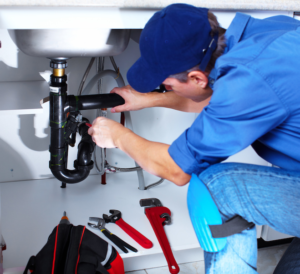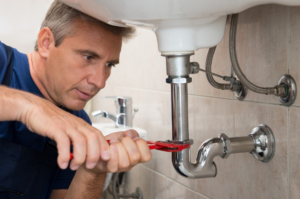Plumbers In Lexington install, repair and maintain the piping and fixtures that carry water, waste products, and steam throughout buildings. They must have excellent problem-solving skills to assess issues and recommend the best solutions.
They also must be comfortable working in tight spaces and lifting heavy equipment. This career requires patience and dedication, as well as a master plumber’s license.

Plumbing systems are comprised of pipes that deliver water, carry waste away, and provide heating and cooling to homes and buildings. Plumbers specialize in inspecting, maintaining, repairing, and installing these essential systems that ensure safe and efficient operations. They can replace and install faucets, toilets, showers, garbage disposals, dishwashers, and more. They can also work on large-scale plumbing projects like re-piping or sewer systems, and are typically required to have an extensive knowledge of building codes and regulations.
There are several paths to becoming a plumber, including the traditional “earn while you learn” approach that involves working as an apprentice and eventually becoming a journeyman or master plumber after a few years of experience. Many plumbers choose to enroll in a vocational school or community college program, where they can obtain the technical skills and training necessary for the trade. Plumbers must also pass a state or city-specific licensing exam to become certified.
While most plumbers work on residential properties, some specialize in commercial or industrial settings. Licensed commercial plumbers can work on larger-scale projects that may include high rise office buildings, malls, or hospitals. They are typically required to have a more in-depth understanding of building codes and regulations, as well as the ability to troubleshoot complex problems that may arise in these types of environments.
As a result of frequently interacting with clients, plumbers must have strong customer service skills. This includes being able to listen carefully to concerns, answer questions thoroughly, and explain complicated issues in simple terms. Plumbers should also be able to communicate effectively, both written and verbally, and be reliable and punctual when arriving at a job. They should also be willing to work overtime as needed to meet deadlines. Finally, plumbing is a physically demanding profession, so it’s important that plumbers are in good physical shape and comfortable working with tools. They often lift heavy objects and are exposed to hot, humid conditions. This can lead to heat exhaustion and dehydration, so it’s important that they take the proper precautions to protect themselves. In addition, they are at risk of exposure to human waste, which can contain infectious diseases like cholera, typhoid, hepatitis, and polio.
Maintenance
Plumbing systems are complex and interconnected, so it’s important that they are regularly maintained to prevent problems like water leaks and clogged drains. Plumbers can help keep your plumbing system in good condition by conducting regular inspections, cleaning drains, and repairing or replacing parts as needed. This preventive maintenance can save you money on utility bills and ensure that your plumbing system is working properly.
In addition to routine maintenance, plumbers are often called to address emergency issues. These can include leaking faucets, backed-up toilets, and flooding caused by burst pipes. In these cases, plumbers need to be able to diagnose the problem quickly and make repairs on-the-spot. This requires them to have a wide range of skills, including troubleshooting, critical thinking, and physical strength.
Plumbers also work in residential and commercial settings, installing and repairing plumbing fixtures and appliances such as sinks, toilets, bathtubs, showers, and water heaters. They also use specialized tools to unclog drains and sewer lines, and may be responsible for ensuring that all plumbing components are installed according to building codes. Plumbers in larger settings may collaborate with construction teams and architects to ensure that plumbing is integrated seamlessly into new building projects.
As a skilled tradesperson, a career as a plumber can be very rewarding. It offers stability, good pay, and opportunities for advancement. However, it’s not a job for everyone. It’s very physically demanding and requires a lot of travel. It’s also not well suited for people who have a fear of germs or don’t want to get their hands dirty. As a result, many plumbing apprentices drop out of the industry after only a few months or weeks of training. If you’re considering becoming a plumber, consider these factors carefully before making a decision.
Repair
When pipes leak or break, it’s not just a nuisance; it can cause serious damage to the property and belongings inside. While some of these problems may be fixed with at-home solutions, the majority of them require professional attention from experienced plumbers. Repairs may involve replacing or rerouting pipes, fixing water heaters, repairing toilets, faucets, showers and sinks, and unclogging drains. Plumbers also perform a wide range of other duties like inspecting plumbing systems, assessing the condition of old pipes, and identifying potential problem areas.
Another common service offered by plumbers is locating and shutting off the main water supply to a home or business. This helps prevent further damage and minimizes water wastage. Plumbers also install and repair water meters, faucets, and toilets. They may even replace whole water fixtures if they’re not functioning properly.
Some of the most important repairs that plumbers can do are related to sewer lines and sewage systems. When these are damaged, it can lead to significant problems for the entire house, such as flooding and severe mold growth. These problems can also be dangerous for household members and pets. Fortunately, these issues can be prevented with regular maintenance and timely repairs from plumbers.
The most common sign that a sewer line is damaged is a foul smell in the house or basement. Other signs include abnormal noises, running water, and stains near pipes and appliances. If you notice any of these problems, call your local plumber right away for emergency services. They will be able to fix the problem quickly and efficiently before it worsens.
Having a well-functioning plumbing system is essential for any home or office. Without it, people would have trouble getting clean water and ensuring that waste is disposed of correctly. Plumbers are skilled professionals who are trained to repair and maintain these systems. They have the knowledge, tools and experience to handle all kinds of plumbing problems. They can even help with installing new appliances and piping. This makes them an indispensable part of any household or workplace. If you’re looking for a reliable plumber, look no further than Plumbing NYC!
Troubleshooting
There are many plumbing problems that you may run into in your home, but some of them require expert attention from a plumber to resolve. This is especially true for clogged toilets, leaky pipes, and other major issues that can lead to water damage in your home. When you encounter these issues, it is important to call a plumber right away so that they can fix the problem before it gets worse.
Leaking Pipes
Anywhere you have a pipe in your house, there is the possibility of it leaking. This is not only annoying but can cause major problems for your house if left unchecked. For example, it can rot wood, create water spots on walls and ceilings, and even lead to mold growth. In addition, a leaking pipe can also lead to high water bills and cause water waste. To fix this issue, a plumber can install new faucets and valves or replace old ones.
Drain Cleaning
Any drain in your home can get clogged with food, paper products, or other debris over time. If this occurs, you may be able to use a plunger or drain cleaner to clear the blockage. However, more serious clogs can result in sewage backups and other health problems. Plumbers can use a camera to locate the clog and then remove it with tools or hydro jetting.
A plumbing company can help with a wide variety of plumbing issues. If you’re experiencing low water pressure, a clogged toilet, or a broken garbage disposal, these are all reasons to call for help. If you’re not sure how to fix the problem yourself, a plumber can walk you through the process step by step and fix it for you.
Plumbing issues can be a huge inconvenience for homeowners, but they don’t have to be. With a little troubleshooting, you can solve most of these issues on your own without having to call for professional help. Just make sure to turn off your water before trying any DIY fixes, and always be safe when working with power tools or electrical equipment.
